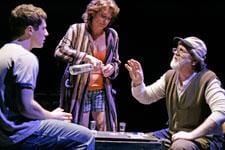Morris Panych is a funny guy. This is the playwright who, after all, dedicated the West End production of his play Vigil “to all who have died and all who’ve not yet got around to it.” His pitch-black comedies about messianic goldfish or mistaken identities in palliative care showcase a writing style that is intelligent, empathetic and possessing a wit so sharp it could circumcise a rhino. Plays like Vigil and The Girl in the Goldfish Bowl and are ripe with Panych’s special brand of macabre hilarity, but the playwright takes a sombre new direction with his latest offering, The Trespassers, premiering at Stratford on Fri, Aug 21.
It’s the story of the special relationship between Hardy (played by Joseph Ziegler) and his troubled grandson Lowell (Noah Reid). Hardy’s penchant for gambling and radical socialism may make an unlikely role model for 15-year-old Lowell, but he’s determined to help the youth through the pitfalls of adolescence even if it means thwarting Lowell’s overprotective, church-going mother Cash (Kelli Fox). Mom means well, but her desire to pump Lowell full of “mood stabilizing” drugs after a suicide attempt and a diagnosis of borderline personality disorder ratchets up her conflict with the boy’s grandfather.
As antidote to Cash’s medical and ecclesiastical interference, the old man embarks on a campaign to enrich his grandson’s life with poker lessons, late-night raids of a neighbouring peach farm and an ill-advised deflowering courtesy of Hardy’s girlfriend — an elderly stripper named Roxy (played by Lucy Peacock). While that last endeavour doesn’t quite work out as planned, Lowell and Roxy strike up an unlikely friendship that helps them face the news of Hardy’s terminal cancer.
Panych began writing the play a few years ago, shortly after his parents’ deaths. This brush with mortality got the playwright musing on his own fear of the unknown and humanity’s reluctance to accept that which it cannot change.
“The main cornerstone of the play is control,” Panych says, “how we try to control life and death and each other, but it’s futile because we actually have no control.”
Panych sees this impulse to subjugate manifesting in many ways, including the increasing role of pharmaceuticals in parenting. “More and more people are using this bipolar thing as an excuse for odd behaviour,” Panych says. “Children are being controlled because they’re not acting ‘normally.’”
Parts of his own past served to inform The Trespassers and some of its characters. Hardy is a blend of Panych’s idealized fantasy granddad, with bits of his own father mixed in. “The parts of my father that I love, I put in the character,” says Panych. “I left out the rest.” The peach theme running throughout the play harkens back to the senior Panych’s love of the fruit and the Okanagan Valley.
As with his other plays Panych is also directing this new piece. He acknowledges that it can be tricky wearing two hats in the production. “It’s hard to defend the script when you’re also the director,” he admits. “I get my play to a place where it’s ready to be produced, but then I start to doubt it when I view it as a director.”
Keeping script changes to a minimum is tricky during any production, as the performers begin to discover and refine their roles. “Actors can sometimes commandeer a script away from you,” Panych says with a chuckle. “But being a good director means helping them get to the script and make it live in the way in which it was written.”
Panych’s partner, Ken MacDonald serves as art director on The Trespassers (the two frequently work together), but his involvement in each production usually starts long before the play is finished.
“Sometimes I wait to show it to him because he can really do a lot of damage,” laughs Panych. “But Trespassers he liked right away so I knew I was onto something.”

 Why you can trust Xtra
Why you can trust Xtra


